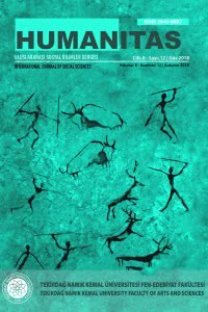“I Smell the Ellero River Already”: Roberto G. Fernández’in Holy Radishes! Romanında Travma ve Sürgün
Travma çalışmaları insan acılarına ve bu acıların kültürel ve estetik ifade biçimlerine entelektüel ve etik bir tepki oluşturmayı amaçlamaktadır. Travma çalışmaları insan davranışını ve sorunlarla başa çıkma stratejilerini anlamaya yönelik paradigmalar sunan displinlerarası eleştiriye ilham olmuştur. Sömürge sonrası travma kuramından yola çıkarak, bu çalışma Roberto G. Fernández’in Holy Radishes! romanında var olan travma teorisine nasıl meydan okuduğunu ve Avrupa psiko-analitik merkezli travma teorisinin Küba travma tecrübesini aktarmada yetersiz olduğunu ileri sürmektedir. Metin, travma tecrübesinin sosyal, tarihi ve kültürel bağlamlarını göz önünde bulundurarak anlam oluşturan travmanın özgüllüğüne odaklanmaktadır. Bir başka deyişle, makale sürgünün yol açtığı acılara tanıklık eden metni sömürge sonrası travma kuramı bağlamında inceleyerek Avrupa merkezli yaklaşımdan uzaklaşmayı amaçlamaktadır. Bu sayede travma kuramının kolonyal travmayı anlamadaki etkinliğini zoraki göç, sürgün, diaspora ve politik şiddet bağlamında tartışmayı hedeflemektedir.
Anahtar Kelimeler:
travma, sömürüsonrası travma, kollektif travma, zamansallık, eşiktelik
“I Smell the Ellero River Already”: Trauma and Exile in Roberto G. Fernández’s Holy Radishes!
Trauma studies aims to construct an intellectual and ethical response to human suffering and their cultural and artistic representations. Trauma studies have inspired an array of disciplinary and interdisciplinary criticism that offer paradigms for understanding human behavior and coping strategies. Drawing on postcolonial trauma theory, this essay analyzes how Roberto G. Fernández in his novel Holy Radishes! complicates and challenges existing trauma paradigms suggesting that existing European psychoanalytic origins of the trauma theory are not adequate for depicting Cuban trauma experience. The text focuses on the specificity of trauma that constructs meaning through considering social, historical, and cultural contexts of traumatic experience. In other words, the paper aims to break with Eurocentrism by analyzing the text that bears witness to the suffering caused by exile. Thus the paper aims to discuss the usefulness of trauma theory for understanding colonial trauma caused by forced migration, exile, dispossession, diaspora, and political violence.
Keywords:
Trauma, Postcolonial trauma, eurocentrism, temporality, liminality,
___
- Alexander, J. C. (2004). Toward a theory of cultural trauma. In J. J. Alexander et al. (Eds), Cultural trauma and collective identity (pp. 196-265). Berkeley: University of California Press.
- Altındiş, H. (2015). Immigrant labor in contemporary southern literature, 1980-2010 (Published doctoral thesis). University of Arkansas, Fayetteville.
- Alvarez-Borland, I. (1998). Cuban American literature of exile: From person to persona. Charlottesville: University of Virginia Press.
- Balaev, M. (2012). The Nature of trauma in American novels. Evanston, IL: Northwestern University Press.
- Brown, L. (1995). Not outside the range: One feminist perspective on psychic trauma. In C. Caruth (Ed.), Trauma: Explorations in memory (pp. 100-112). Baltimore: John Hopkins University Press. Caruth, C. (1996). Unclaimed experience: Trauma, narrative, and history. Baltimore: John Hopkins University Press.
- Craps, S. (2013). Postcolonial Witnessing: Trauma Out of Bounds. New York: Palgrave.
- Dorahy M. J. and Onno van der Hart. (2007). Relationship between trauma and dissociation: A historical analysis. In Eric Vermetten et al. (Eds.), Traumatic Dissociation: Neurobiology and Treatment (pp. 3-31). Washington, DC: American Psychiatric Publishing.
- Fernandez, R. G. (1995). Holy Radishes! Houston: Arte Publico Press.
- García, M. C. (1997). Havana USA: Cuban Exiles and Cuban Americans in South Florida, 1959-1994. Berkeley: University of California Press.
- Gibbs, A. (2015). Contemporary American trauma narratives. Edinburgh: Edinburgh University Press.
- Kaminsky, A. (1999). After Exile: Writing the Latin American diaspora. Minneapolis: University of Minnesota Press.
- Lukacs, G. (1971). The theory of the novel. Cambridge, MA: MIT Press.
- Munro, M. (2007). Exile and Post-1946 Haitian literature: Alexis, Depestre, Ollivier, Laferrière, Dandicat. Liverpool: Liverpool University Press.
- Pérez, L. (1986). Cubans in the United States. ANNALS, AAPSS, 487.
- Root, M. (1992). Reconstructing the impact of trauma on personality. In L. S. Brown & Ballou M. (Eds.), Personality and psychopathology: Feminist reappraisals (pp. 229-266). New York: Guilford Press.
- Rothberg, M. (2008). Decolonizing trauma studies: A response. Studies in the Novel, 40, 224-234.
- Said, E. (2000). Reflections on exile and other essays. Cambridge: Harvard University Press.
- Stolorow, R. D. (2011). Trauma and human existence: Autobiographical, psychoanalytic and philosophical reflections. New York: The Atlantic Press.
- Suleiman, S. R. (1998). Exile and creativity: Signposts, travelers, outsiders, backward glances. Durham: Duke University Press.
- Tal, K. (1996). Worlds of hurt: Reading the literatures of trauma. New York: Cambridge University Press.
- Vásquez, M. S. (1991). Gender in exile: Mothers and daughters in Roberto G. Fernández’s Raining Backwards. In J. Whitlark & Aycock, W. M. (Eds.), The literature of emigration and exile (pp. 79-86). Lubbock, TX: Texas Tech University Press.
- Vickroy, L. (2002). Trauma and survival in contemporary fiction. Charlottesville: University of Virginia Press.
- Vickroy, L. (2014). Voices of Survivors in Contemporary Fiction. In M. Balaev (Ed.), A Contemporary approach in literary trauma theory (pp. 130-151). New York: Palgrave MacMillan.
- Vickroy, L. (2015). Reading trauma narratives: The contemporary novel and the psychology of oppression. Charlottesville: University of Virginia Press.
- Whitehead, A. (2004). Trauma fiction. Edinburgh: Edinburgh University Press.
- ISSN: 2147-088X
- Yayın Aralığı: Yılda 2 Sayı
- Başlangıç: 2013
- Yayıncı: Namık Kemal Üniversitesi
Sayıdaki Diğer Makaleler
Üstkurmaca Olarak İlhan Tarus’un “Bir Adamın On Senelik Hayatı” Öyküsü
Polonyalı General Taczanowski’nin Sultan Abdülaziz’e Yazdığı Tezkere
Emilian PRAŁAT, Osman Fırat BAŞ
Postdramatik Bir Okuma: Simon Stephens’ın Üç Krallık Oyununda Mizojini
1866 Girit İsyanı ve Giritli Aileler Meselesi
Toplumsallık ve Kendilik Arasında Clèves Prensesi (I)
Tasarım Beceri Atölyelerinin Roman Çocukların Eğitimine Katkıları: Edirne Örneği
Tülay TEKİN YILMAZ, Muhammed TAĞ, Önder ARPACI, Fatma SOYDEMİR, Gökhan ILGAZ
Atom Bombası Edebiyatı, Frankenstein ve Operadaki Hayalet’in Mahşerî Yeniden İnşası: Onibaba
Azerbaycan’ın Bağımsızlık Tarihinde Sosyalist Bir İsim: Aslan Bey Sefikürdski (1881-1937)
